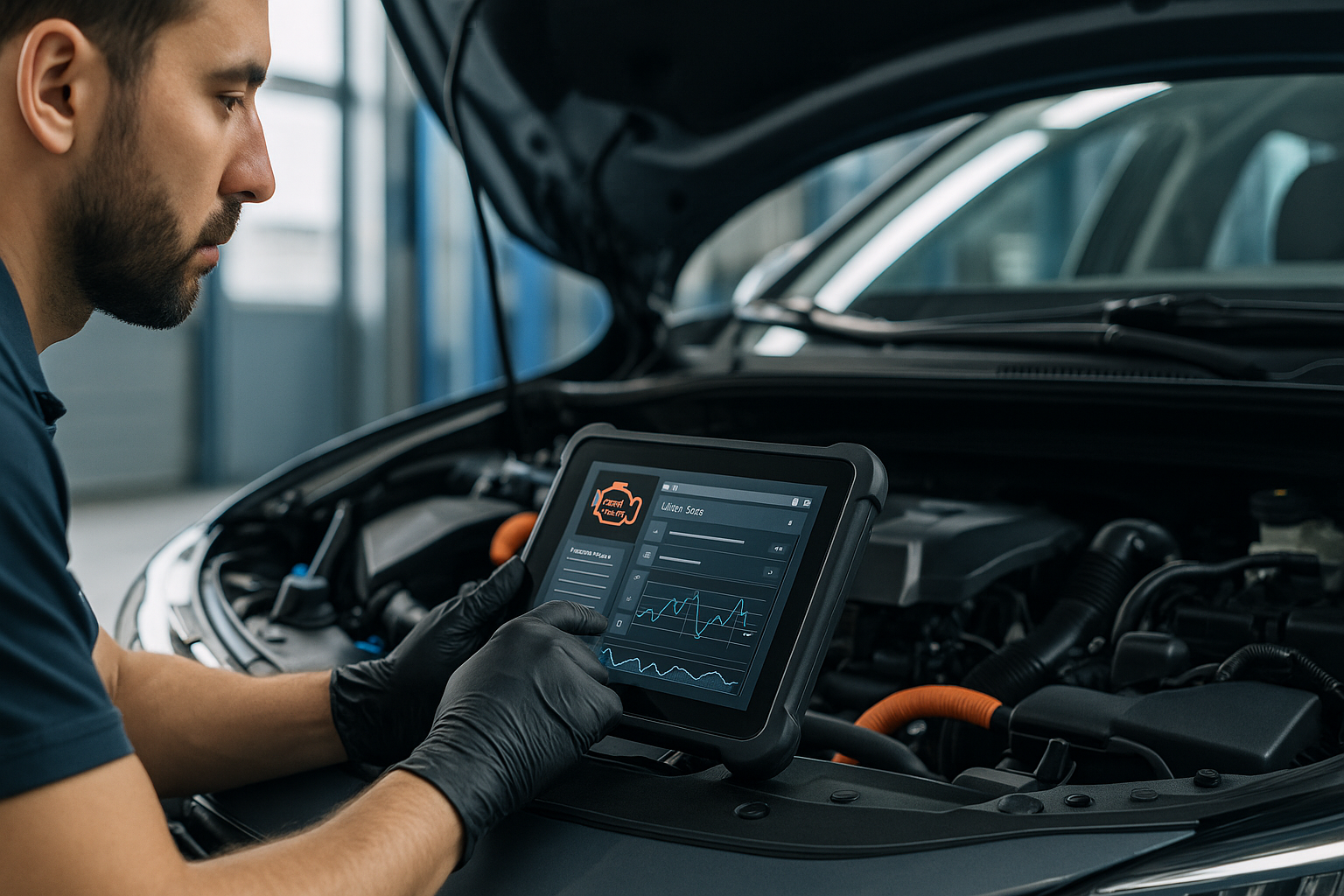Automotive Technology Career Opportunities: What to Expect in 2025 and Beyond
The automotive industry is experiencing its most dramatic transformation since the introduction of the assembly line. As vehicles become increasingly sophisticated—incorporating electric powertrains, autonomous systems, and complex electronics—the demand for skilled automotive technicians has never been higher. Far from being replaced by technology, automotive professionals are evolving into high-tech specialists commanding premium wages.
Why Automotive Technology is Thriving
Market Drivers
Multiple powerful trends are reshaping automotive careers:
- Electric vehicle adoption requiring new specialized skills
- Advanced driver assistance systems (ADAS) creating complexity
- Vehicle age increasing driving repair and maintenance demand
- Shortage of skilled technicians creating wage pressure
- Technology integration making vehicles more sophisticated
Career Evolution
The automotive technician role has transformed:
- From “grease monkey” to diagnostic specialist
- From manual repairs to computer systems
- From commodity service to specialized expertise
- From low wages to competitive compensation
- From simple tools to advanced technology
Automotive Technology Career Paths
Automotive service technicians and mechanics represent one of the most stable and accessible career paths in the skilled trades, with clear progression opportunities and increasing specialization potential.
Entry-Level Positions
- Lube Technician: $28,000-$35,000 annually
- General Service Technician: $32,000-$42,000 annually
- Apprentice Technician: $35,000-$45,000 annually
Experienced Technician Roles
- Automotive Technician: $40,000-$60,000 annually
- Master Technician: $50,000-$75,000 annually
- Diagnostic Specialist: $55,000-$80,000 annually
Specialized and Advanced Positions
- Electric Vehicle Technician: $60,000-$90,000 annually
- ADAS Calibration Technician: $55,000-$85,000 annually
- Performance Tuner: $50,000-$100,000+ annually
- Shop Foreman/Manager: $60,000-$95,000 annually
- Service Advisor: $45,000-$80,000 annually (with commission)
Specialization Opportunities
By Vehicle System
Engine and Powertrain
- Internal combustion diagnostics
- Transmission specialists
- Performance modifications
- Engine rebuilding
- Hybrid systems
Electrical and Electronics
Automotive engineering technicians specialize in the complex electronic systems that are increasingly central to modern vehicles:
- Computer system diagnostics
- Wiring and circuit repair
- Battery and charging systems
- Electronic control modules
- Sensor diagnostics
Chassis and Suspension
- Brake systems specialist
- Steering and alignment
- Suspension tuning
- Drivetrain repair
- Wheel and tire services
Emerging Technology Specializations
Electric Vehicle Technology
Electric vehicles represent the fastest-growing specialization in automotive technology, with dedicated alternative fuel vehicle technology programs now available at many technical schools. Key competencies include:
- High-voltage battery systems
- Electric motor diagnostics
- Charging system installation
- Thermal management systems
- Battery health assessment
- EV-specific safety training required
Advanced Driver Assistance Systems (ADAS)
Specialists in electronic equipment installation and repair are increasingly in demand as vehicles incorporate more sophisticated sensor and camera systems:
- Camera and sensor calibration
- Radar system diagnostics
- LiDAR technology
- Lane-keeping system repair
- Adaptive cruise control
- Collision avoidance systems
Connected Vehicle Technology
- Telematics systems
- Over-the-air updates
- Infotainment diagnostics
- Smartphone integration
- Cybersecurity awareness
By Vehicle Type
Luxury and European Vehicles
- BMW, Mercedes-Benz, Audi specialization
- Manufacturer-specific training
- Premium pricing for services
- Advanced diagnostic equipment
- Complex electrical systems
Performance and Racing
- High-performance tuning
- Track preparation
- Dyno tuning and optimization
- Custom fabrication
- Racing support services
Collision and Body Repair
Automotive body and related repairers focus on restoring vehicle aesthetics and structural integrity. Those interested in this specialization can pursue autobody/collision repair technology programs that cover:
- Frame straightening and alignment
- Dent removal and bodywork
- Paint matching and refinishing
- Structural welding
- Insurance claim procedures
Heavy-Duty and Diesel
Bus and truck mechanics and diesel engine specialists work on larger commercial vehicles. Specialized training is available through diesel technology programs, which cover:
- Diesel engine systems
- Air brake systems
- Commercial vehicle regulations
- Fleet maintenance procedures
- Heavy-duty transmissions
Classic and Vintage Vehicles
- Restoration work
- Carburetor rebuilding
- Mechanical fuel injection
- Parts fabrication
- Original specifications maintenance
Education and Training Requirements
Training Pathways
Most aspiring automotive technicians pursue formal training through automotive technology programs or automobile/automotive mechanics programs, which provide comprehensive preparation for the field. Those interested in more engineering-focused roles may consider automotive engineering technology programs that combine hands-on technical skills with engineering principles:
- Trade school programs: 6 months to 2 years
- Community college programs: 2 years (ASE preparation)
- Apprenticeship programs: 2-4 years
- Manufacturer training: Varies by brand
- Military automotive training: Various programs
Industry Certifications
ASE Certifications (Automotive Service Excellence)
- A1: Engine Repair
- A2: Automatic Transmission/Transaxle
- A3: Manual Drive Train and Axles
- A4: Suspension and Steering
- A5: Brakes
- A6: Electrical/Electronic Systems
- A7: Heating and Air Conditioning
- A8: Engine Performance
- A9: Light Vehicle Diesel Engines
- Master Technician: 8 certifications required
Manufacturer Certifications
- Brand-specific training programs
- Factory technician levels
- Online learning modules
- Hands-on workshop training
- Ongoing education requirements
Specialized Certifications
- EPA 609 Certification (A/C refrigerant handling)
- Hybrid/EV Safety Certification
- ADAS Calibration Certification
- I-CAR Training (collision repair)
- State Inspection Licenses
What Makes a Successful Automotive Technician
Technical Competency
- Strong diagnostic and troubleshooting skills
- Understanding of automotive systems
- Proficiency with scan tools and software
- Electrical system knowledge
- Mechanical aptitude
- Computer literacy
Problem-Solving Abilities
- Systematic diagnostic approach
- Logical thinking and analysis
- Ability to research technical information
- Pattern recognition
- Root cause analysis
Physical Requirements
- Manual dexterity and coordination
- Physical stamina for standing/bending
- Ability to lift heavy components
- Good vision and color perception
- Comfort working in various conditions
Professional Attributes
- Attention to detail and accuracy
- Strong customer communication skills
- Honesty and integrity
- Willingness to continuous learning
- Time management abilities
- Safety consciousness
Industry Outlook
Job Growth Projections
According to the Bureau of Labor Statistics:
- Automotive technician jobs stable through 2032
- Approximately 69,000 job openings annually
- Demand shifting toward skilled specialists
- Critical shortage of qualified technicians
- Premium wages for EV and electronics specialists
Technician Shortage
The industry faces a critical talent gap:
- 642,000 technician shortage projected by 2026
- Retiring baby boomer technicians
- Increased vehicle complexity
- Negative perception of trade careers
- Opportunity for new entrants
High-Demand Employment Settings
- Dealership service departments: Brand-specific work
- Independent repair shops: Variety of vehicles
- Specialty shops: Performance, European, etc.
- Fleet maintenance: Commercial vehicles
- Mobile repair services: Convenience-focused
- Manufacturer positions: Engineering support, field service
Tools and Equipment Investment
Essential Hand Tools
Beginning technicians typically invest in:
- Socket and wrench sets
- Screwdrivers and pliers
- Specialty automotive tools
- Torque wrenches
- Jack stands and creeper
- Initial investment: $2,000-$5,000
Diagnostic Equipment
Professional technicians add:
- OBD-II scan tool
- Multimeter and test lights
- Compression and leak-down testers
- Timing light
- Battery analyzer
- Additional investment: $1,000-$3,000
Advanced Professional Equipment
Master technicians often own:
- Advanced diagnostic scanner
- Oscilloscope
- Fuel pressure testers
- Laptop with software subscriptions
- Specialty manufacturer tools
- Professional investment: $5,000-$15,000+
Shop Equipment (Employer-Provided)
- Vehicle lifts
- Tire changers and balancers
- Brake lathes
- A/C service machines
- Alignment equipment
- Engine analyzers
Safety Considerations
Primary Hazards
Automotive technicians face:
- Electrical shock (especially on EVs)
- Burns from hot components
- Chemical exposure (fluids, cleaners)
- Crushing injuries from vehicles
- Eye injuries from debris
- Respiratory hazards from fumes
Safety Protocols
Professional shops enforce:
- Proper vehicle support procedures
- Lock-out/tag-out for hybrid/EV work
- Personal protective equipment use
- Material Safety Data Sheet (MSDS) compliance
- Proper ventilation requirements
- Fire safety procedures
Personal Protective Equipment
Essential safety gear includes:
- Safety glasses (primary requirement)
- Nitrile or mechanic gloves
- Steel-toed boots
- Hearing protection
- Respirators (when needed)
- High-voltage gloves (for EV work)
Getting Started in Automotive Technology
First Steps
- Take automotive classes in high school if available
- Research local training programs (trade schools, community colleges)
- Visit dealerships and shops to understand the work
- Consider starting as a lube technician to learn
- Assess your interest in both mechanical and electronic work
Choosing the Right Training Program
When exploring automotive technology programs, look for curricula offering:
- ASE-accredited curriculum
- Modern vehicles and equipment
- Hybrid/EV training components
- Experienced instructor staff
- Manufacturer partnerships
- Job placement assistance
- Hands-on training emphasis
Entry Strategies
Direct Employment
- Start at entry-level position
- Learn on-the-job
- Employer may support training
- Immediate income
- Slower advancement
Training First
- Complete certificate or degree through automotive mechanics technology programs
- Enter with foundational knowledge
- Start at higher level
- Investment in tuition
- Faster career progression
Manufacturer Programs
- Brand-specific training
- Potential dealership placement
- State-of-the-art curriculum
- May include paid internship
- Strong career pathway
Career Advancement Opportunities
Progression Paths
Automotive professionals advance by:
- Earning ASE certifications (Master status)
- Specializing in high-demand areas
- Moving to service advisor roles
- Becoming shop foremen or managers
- Opening independent repair shops
- Transitioning to manufacturer positions
Business Ownership
Starting an automotive repair business requires:
- Technical expertise and reputation
- Business management skills
- Significant capital investment
- Facility and equipment
- Insurance and licensing
- Customer base development
Alternative Career Paths
Automotive skills transfer to:
- Technical training and instruction
- Service management positions
- Parts and tool sales
- Insurance claims adjustment
- Fleet management
- Manufacturer technical support
Income and Compensation
Factors Affecting Earnings
- Certification level (ASE Master status)
- Specialization area (EV, European)
- Geographic location
- Employment setting (dealer vs. independent)
- Productivity and efficiency
- Years of experience
Pay Structures
Technicians are commonly paid by:
- Flat-rate: Paid by job completion (most common)
- Hourly: Fixed hourly wage
- Salary: Fixed annual compensation
- Commission: Percentage of labor sales
- Hybrid models: Combination of above
Additional Compensation
Many positions offer:
- Tool allowances
- Continuing education support
- Health insurance and benefits
- Retirement plans
- Performance bonuses
- Manufacturer incentives
The Future of Automotive Technology
Emerging Trends
The industry is evolving toward:
- Increased electric vehicle adoption
- Autonomous vehicle technology
- Subscription-based vehicle features
- Over-the-air software updates
- Advanced materials (carbon fiber, aluminum)
- Alternative fuels (hydrogen)
Skills for the Future
Tomorrow’s technicians will need:
- Software troubleshooting abilities
- High-voltage safety training
- Electronics expertise
- Computer networking knowledge
- Continuous learning mindset
- Adaptability to change
Job Security Outlook
Despite automation concerns:
- Vehicles still require maintenance
- Complexity creates specialist demand
- Diagnostic work remains human-dependent
- Local service always needed
- Retrofit and upgrade opportunities
Conclusion
Automotive technology offers an exciting and evolving career path for those interested in combining mechanical work with modern technology. The industry’s transformation toward electric and autonomous vehicles isn’t eliminating jobs—it’s elevating the profession and creating opportunities for skilled specialists.
With a critical shortage of qualified technicians, competitive wages rising, and technology making the work more intellectually engaging, there has never been a better time to enter automotive technology. Whether you’re drawn to cutting-edge alternative fuel vehicle technology, high-performance tuning, collision repair, or classic car restoration, the automotive field offers diverse paths to a rewarding career as an automotive service technician.
The journey requires continuous learning and adaptation, but for those who embrace the challenge, automotive technology provides stable employment, good income, and the satisfaction of diagnosing and solving complex problems. If you’re mechanically inclined, enjoy technology, and like the idea of working with your hands and your mind, automotive technology deserves serious consideration.
Ready to shift your career into high gear? Explore automotive technology programs in your area and take the first step toward joining this dynamic and essential industry.



